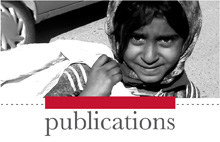After the US’s invasion of Iraq in the spring of 2003, many Iraqis were optimistic that they were about to see their country enter a new era, filled with freedoms and opportunities. But these hopes were quickly dissipated. The occupation was prolonged, the reconstruction a failure, and the promised liberation had turned into a bloody civil war that seemed hopeless. To these scourges was added the bane of armed groups, poverty, and the degeneration of social services.
Like many countries in the region, Iraq had long enjoyed a diversity of communities and religions where all lived together in relative peace. But throughout these conflicts and dictatorships, these communities were played one against the other, widening the ethnic and religious divisions between them. Since the spring of 2003, interdenominational and interethnic confrontations have claimed hundreds of thousands of victims, leaving wounds that are difficult to heal.
Even if it was elected democratically, Nouri al-Maliki’s government has been unable to move forward with a national reconciliation, to assure security, or to provide basic services to the population. The signs of failure are everywhere: public services are disintegrating.
Although Iraq has a long tradition of education, the school system is in a deplorable state, and it has further degraded since 2003 as a result of the outbreaks of violence, the economy’s collapse, and corruption driven by the low salaries paid to teachers. According to UNICEF, today more than 40% of children in the city of Basra, and more than 70% of the children in Baghdad, do not attend school.
The infrastructures of health care institutions have been weakened immensely and, facing enormous strain as a result of limited medical resources and personnel shortages, struggle to care for the numerous wounded and sick. More and more, civilians hesitate to visit medical centers for fear of being attacked at the checkpoints. Two thousand doctors have been killed since 2003, more than twenty thousand are refugees outside the country, and more than half of medical personnel have lost their jobs. The use of depleted uranium in weapons has considerably increased the number of miscarriages and cases of cancer.
The quantity and quality of drinkable water is a problem throughout the country. The poor maintenance of the water systems and wastewater discharge into rivers, the principal source for the population, create problems with contamination in many regions.
Every day, as a result of violence, the Iraqis’ living conditions degrade. A brain drain is inevitable. Between 2003 and 2007, nearly 300 academics were killed and many others received death threats.
The plight of women is not enviable either. Respect for their rights has lost considerable ground: 70% of girls do not attend school; sexual and domestic violence and crimes of honor have skyrocketed; sexual trafficking is increasingly prevalent. There was a sharp decline in their participation in the labor market, and their involvement in politics is perilous; campaigning exposes women to threats and extreme social pressures.
The recent legislative elections held on March 7 2010 marked the beginning of a new legislature. These elections also heralded the beginning of a new Iraq. But now it is time to ask what are the prospects of this fragile state coping with a weakened central government, an infrastructure that has disintegrated, an impoverished population, and religious and ethnic tensions that threaten to plunge the country into chaos. All of these questions arise at the same moment that the Americans plan to withdraw their troops.
Iraq was once considered one of the most developed countries in the region. With a health and education system to be envied and one of the most progressive constitutions in the Arab world, it was once described as a nation of engineers. Alas, the situation has deteriorated dramatically. In this context, international solidarity seems to be a necessary imperative in order to give the new generation a right to life and security.












